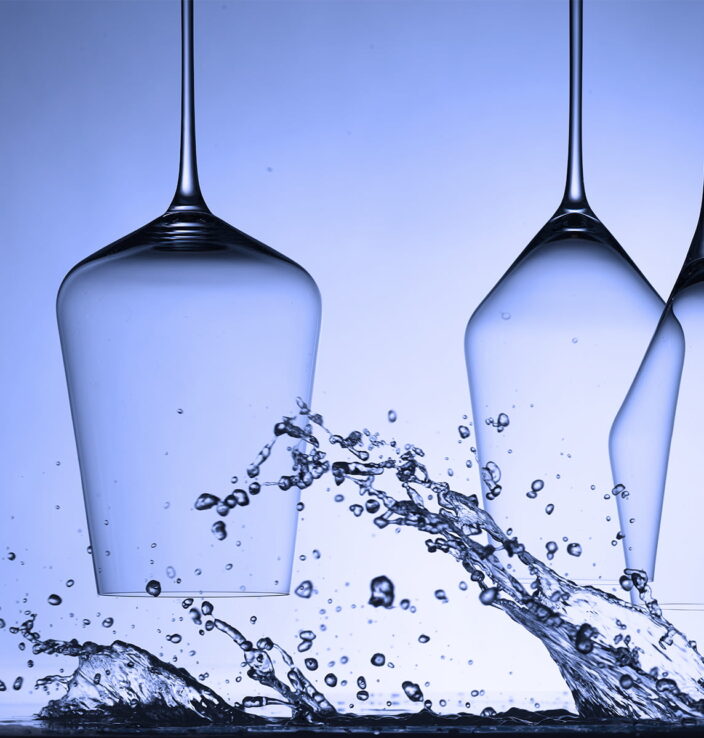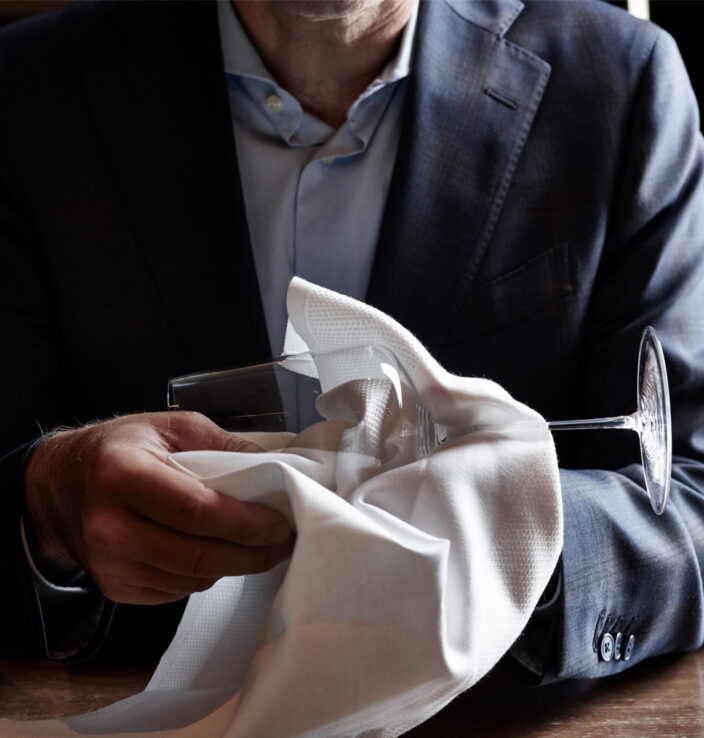Care Instructions

The following tips on glass care should help you to enjoy our glasses for a long time. Basically, both machine cleaning and gentle hand washing are suitable. The advantage of the dishwasher is that manual polishing, the most frequent cause of glass breakage, is not necessary. The exclusive use of a glass washing programme and an optimal setting of temperature, water hardness and rinsing chemistry must be ensured in order to avoid glass corrosion.
Hand washing is, of course, the chemically gentler method of cleaning. However, greater attention must be paid to avoid the risk of breakage. Never grip the glass only by the stem or the base, but hold the goblet gently in your hand so that the stem is between your index and middle finger.
Machine washing
All of our products are suitable for dishwasher use, provided the following recommendations are observed:

- Make sure that your dishwasher is serviced regularly according to the manufacturer’s instructions and that the correct water hardness has been set.
- Depending on the water quality, partial softening or full demineralization is recommended. Regularly topping up with salt prevents lime stains that can occur if the water is too hard.
- As soft water generally leaches glass more than hard water, it is advisable to set the water softener to a hardness range of 3 to 8 and dose the rinse aid somewhat higher (but avoid overdosing).
- Follow the instructions of the dishwasher manufacturer regarding machine settings, dosage of detergent, rinse aid and salt. For better protection, we also recommend the use of special glass cages.
- Always keep your dishwasher clean and free of grease. Items such as dirty pots, pans and plates should be rinsed before placing them in the machine. Similarly, coffee cups often also have residues that stain. High protein foods such as eggs or meat juice also soil the glasses and should therefore be rinsed off in advance. Moreover, these can also transfer unpleasant odours to the glasses.
- Strainer inserts, filters, nozzles and flushing arms should be kept clean.
- Always use detergents and rinse aids from a quality manufacturer. In general, when rinsing, keep the dosage of detergents low and do not use any other additives if they are already contained in the original. Powders are generally better for dosing. Tabs usually already contain all the additives necessary, making the addition of further rinse aid superfluous. In addition, detergents that are ostensibly free of phosphates should be avoided because of the aggressive phosphate substitutes that were added. Finally, the rinsing agent should be gentle so that the glass will not be damaged.
- In principle, it is advisable to rinse residues out of the glass after use. This is especially for wine, whose acidity can damage the glass.
- To avoid scratches and breakage, the glasses should be carefully placed so that they do not bump into either one another or other objects during the washing process.
- Tall, narrow glasses should not be placed in the corner of the basket so that the rinsing aid can reach all parts of the glass without hindrance.
- Always use a delicate or glass cycle with a correspondingly low temperature and the shortest cleaning time (either with a glass icon or at temperatures not exceeding 55°), as excessively high water temperatures contribute to the corrosion process.
- At the end of the washing program, the dishwasher door should be briefly cracked opened to allow the steam to escape.
- Do not remove the glasses until the cooling process is complete. When removing the glasses, make sure to grip one the stems or the bases to avoid leaving fingerprints on the goblet.
- If there is a slight residue of water on the rim or on the base, lift the glass vertically so that the excess water cannot run over the goblet. Then, with a tea towel, carefully dry first the base and then also gently the rim.
Hand washing
When washing by hand, make sure in advance that the work area offers sufficient space and that there is no danger of the glasses coming into contact with nearby objects. If necessary, also make sure to put aside sharp objects such as rings.

- Clean your glasses by hand with warm water and make sure to use only small quantities of a mild detergent.
- A small squeeze of lemon juice in the rinsing water provides brilliant shine free of streaks.
- The goblet and the base should always be washed separately. Therefore, during washing always hold the glass gently by the goblet with the stem between your middle and index finger.
- When cleaning the goblet, avoid placing undue pressure on the inside of the glass, especially from a brush or washing cloth.
- If necessary, use only a soft cloth and never a sponge with a scouring pad in order to ensure that the glass is not scratched.
- Following the gentle hand wash, the glasses are now ready for a thorough immersion rinse with clear, warm water to remove all detergent residues. Thereafter they will shine with a new lustre.
Drying and polishing
In all high-quality wine glasses, including those of our competitors, the stem is generally one of the most sensitive parts.
To avoid stem breakage, and for best overall results, please follow the drying and polishing instructions below:



- To dry, place the glass with its goblet on a tea towel.
- For extra shine, hold the glass with the goblet over steam.
- Dry your glasses carefully with a lint free cloth.
- Do not use fabric softener or textile starch to clean your tea towels.
- Wait until the glasses have cooled down before polishing.
- Dry and polish the base first.
- Do not hold the glass by the base, though, for it could break off.
- Then take it in your hand and polish the goblet with the other hand.
- Start with the inside of the glass, then the rim and finally the outside.
- When polishing, avoid rotating the base and goblet in opposite directions.
Cleaning Decanters and Carafes
In particular, decanters and carafes tend to build up deposits that are very difficult to remove, especially in the bulbous shapes. Below are a few cleaning tips that we hope will help you keep them in good form:

- An easy way to clean a normal glass carafe is to use tabs from brands like Kukident or Corega. These cleaning agents leave behind neither taste nor residue. However, this method is not necessarily recommended for a delicate crystal glass carafe.
- Cleaning carafes with baking soda dissolved in hot water has proven to be very effective. After leaving the mixture time to work, swirl the carafe properly and then rinse well.
- When using ordinary dishwashing liquid, we recommend adding a squeeze of lemon juice to the warm rinsing water. In particular, for slender decanters and narrow champagne glasses this simple treatment will give them a true shine, free of tell tale streaks.
- An old household remedy is cleaning decanters with salt and vinegar. This method has proven especially effective in removing alcohol residues and calcium deposits. Moreover, you might also add a handful of uncooked rice to the carafe and then swirl it, providing a mild abrasive action to gently scrape more recalcitrant stains.
- Another unusual tip is to clean carafes showing red wine discolouration with white wine. However, this method is only helpful for minor stains.
Basis facts that are worth knowing
- Transparent glass is a prematurely solidified glass melt that has not formed complete crystalline structures. When caring for your stemware, you should therefore bear in mind that all glass is subject to corrosion. Glass contains alkaline ions that are, over the years, washed out of the surface, causing cloudiness that is then irreversible.
- Basically, a distinction must be made between reversible and irreversible turbidity. The former is due to calcium deposits or detergent residues, which can usually be fairly easily removed with cleaning agents. Nevertheless, even that can be avoided by gentle care and rinsing. More aggressive cleaning agents favour the second type of irreversible clouding due to corrosion.
- Methods have been developed to prevent or at least to slow this process for as long as possible. Most of them, though, involve the addition of various metal oxides, that we shun, to both reduce corrosion and increase structural strength.
- Contrary to prevailing opinion, it is soft water that favours the corrosion process of glass. Although demineralized water, rainwater or steam do not leave behind residues during drying, they are extremely aggressive in their ion consumption, which immensely aids the corrosion process. The sparing use of detergents in glass care is therefore highly recommended.
- In particular, in the case of engraved, cut, coloured or decorated lead crystal glasses, gentle washing by hand significantly prolongs their life. Since handmade glasses were, historically, mainly decorative glasses, it is clear that these should preferably be washed by hand.
- Modern glass types, on the other hand, are designed for machine cleaning and are therefore more suitable for the dishwasher, even those like ours that are handblown versions.
- As a basic rule, every glass ages. The older a glass, the more sensitive it is and the more gently it should be cleaned. With a few exceptions, most modern glasses are suitable for dishwasher cleaning. Nevertheless, you should observe the following tips when washing them in the machine. That way you will enjoy them for a longer period time.
